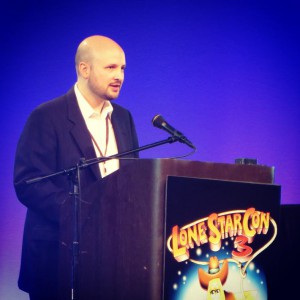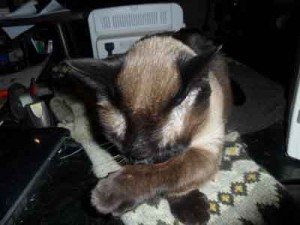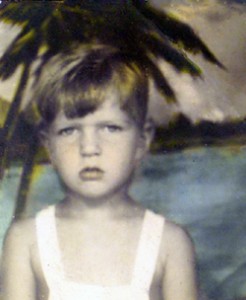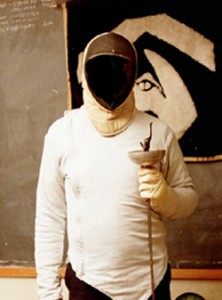interview by Carl Slaughter
 Trevor Quachri recently took over from longstanding Analog editor Stanley Schmidt. Science fiction writers want to know what changes, if any, to expect. They also want to know how, exactly, to sell their stories and how to avoid getting their stories rejected.
Trevor Quachri recently took over from longstanding Analog editor Stanley Schmidt. Science fiction writers want to know what changes, if any, to expect. They also want to know how, exactly, to sell their stories and how to avoid getting their stories rejected.
CARL SLAUGHTER: Will you read every submitted story or assign slush readers?
TREVOR QUACHRI: Every submitted story is pretty absolute, but the overwhelming amount of time, yeah, I’m going to be the only person reading the slush. Stanley Schmidt read all the submissions himself, and that’s something I want to continue, as much as I’m able. I know that’s the opposite of how most other magazines do it, but it’s tough for me to really feel like the magazine reflects my vision or tastes if I’m not actually looking at the majority of stories that come in. That said, I also know that right out of the gate I’m nowhere near as fast as someone with thirty-four years of experience under their belt, so if I’m not quite to where I can do it all yet, I’m also not above accepting a little help for a bit.
CS: How far into a story do you go before you decide not to continue reading? How far into a story do you go before you decide to read it til the end?
TQ: It depends on the story. There are three major questions I’m constantly asking myself as I work , 1) “Is this readable? 2) Where’s the science? 3) Does the science hold up?” — and how far I make it depends on the answers I’m coming up with. If it’s not readable, I don’t get far at all. If it’s readable, but I can’t find the science, I’ll make it further in. If it’s well written and the science is there, then I’ll read the whole thing. Length is also a big factor. For obvious reasons, I’m much more likely to give a 5,000 word short story the benefit of the doubt than I am to make myself stick with a 22,000 word novella that’s still not working for me at the half-way point.
CS: Science fiction is about the exploration of science, but it’s also about the implications of science. How much emphasis do you place on the technical aspects of a story and how much emphasis on the human element?
TQ: Good science fiction has both elements working in concert, hand-in-hand, building off one another. If your story would still work if you largely excised one aspect or the other, you’re either writing bad science fiction or good lit-fic. So a story where one is emphasized to the exclusion of the other is going to be a tough sell for me.
CS: How much of a chance does a new writer have with Analog and how much of an edge does an established writer have?
TQ: The primary advantage an established writer has is that I’m probably going to read them slightly sooner. Otherwise, that’s about it. Much of an established writer’s “edge” is just a matter of them behaving professionally, having a sense of what I’m looking for, and being persistent. Any newcomer can handle that.
CS: Do you automatically publish stories submitted by Analog regulars like Brad Torgerson and Carl Frederick? How often do you reject a story by an author familiar to Analog readers?
TQ: This is probably a better question for the authors, but the short answer to the first part is “Heck no.” They have to earn their spot, just like everyone else. Even the Analog regulars who have sold to me have racked up their share of rejections from me, too. Part of an editor’s job is to say, “This isn’t good enough; I think you can do better,” and it doesn’t do anyone any favors to spare them from that.
CS: How many stories per year are by unpublished writers? How many by writers new to Analog readers?
TQ: Well, I haven’t actually put out a year’s worth of issues yet, so it’s tough to say exactly. I’d guess anywhere from a quarter to a third are from unpublished (or mostly unpublished) writers. Established writers who haven’t previously appeared in Analog are the smallest group, after regulars and new writers, in that order. They probably only make up ten percent or so. That’s not a conscious decision on my part; I think most people who are already selling regularly just don’t branch out all that much.
CS: Will winning Writers of the Future or some other prestigious award get an author a foot in the door with Analog?
TQ: The way I do things right now, I really only look at the cover letter (where most people list their bona fides) after I’ve actually read the story. So I already have a pretty solid sense of whether or not the story works by the time I even see an awards list. If all the accolades seem inconsistent with what I thought, I may go back and give the story another quick once-over to see if I missed something, so awards can act like a little bit of a safety net, but that’s about it.
CS: What subgenres and premises are you especially interested in and which definitely don’t excite you?
TQ: Editors hate being specific about this kind of thing, because it means we’ll see a million bad stories about the subject that we said interested us, and all the good ones with premises that haven’t historically appealed to us (but conceivably still could) will go elsewhere. Broadly, I’d love to see more stories that push the boundaries of what people think of when they hear “hard science fiction.” Hard SF has a very specific image, both among people who love it and people who hate it, but I think that image can be reductive. So anything that challenges that image is the kind of thing that will get my attention. Atypical characters and settings and under-represented disciplines like neurochemistry or immunology or paleontology or metallurgy (or, or, or†�) are all good ways to do that. I joked in a recent editorial that the season two episode of Breaking Bad where Walt and Jesse get stuck in the desert and they use SCIENCE! to save themselves is the best hard SF I’d seen on TV in years. I wasn’t entirely serious, but it’s also not entirely off base, either. Yes, it’s lacking the imaginative elements that are vital to our genre, but the science is both relevant to the story and accurate, and those are really the most important rules of hard SF, as I see it. Beyond that? Surprise me.
CS: How much weight do you give to strong writing and how much to strong science?
TQ: This is another answer that really depends on the story in question. Optimally, it has both to a sufficient degree that I don’t have to weigh them against each other. I’m definitely more capable of polishing the writing of a story with a strong scientific foundation than I am trying to completely overhaul a well-written story with an entirely different scientific rationale. Details can be corrected, but if the whole story is predicated on something that we know just won’t work, there’s only so much to be done. I’ve often compared science fiction (hard SF in particular) to other specialized genres like kung fu movies. If you get a well-acted, well-choreographed movie like Crouching Tiger, Hidden Dragon, that’s great. But even questionably translated kung fu movies are successful in what they set out to do if they deliver great fight scenes. Without those, you’re just watching a Chinese soap opera. Hard SF has a similar relationship to science. That’s more of a broad philosophy than a rule, though: we also published Dune, which isn’t exactly the epitome of hard SF. I believe there should always be room for something like that at Analog.
CS: What can aspiring writers do to improve their chances of getting out of the slushpile?
TQ: Probably the single most common problem I see with otherwise good stories is that they’re too often the wrong length for what they’re trying to accomplish. Either they’re too short to properly develop the elements that are supposed to have gravitas, or they’re too long, full of padding that isn’t easily snipped, bloating a story that could otherwise have been elegant. Get in, tell your story or deliver your idea, and get out. From a more practical standpoint, while I do need some long stories, I need proportionately more short stories, and your odds are better if you’re closer to that end of the spectrum. I can definitely afford to be more adventurous with a 3,500-word story than I can with 17,500 words. So start out small. Less seriously? Stop automatically giving children names like “Timmy” or “Jimmy” or “Billy,” like they just stepped out of an episode of Lassie. That signifies “The Future!” to a reader about as much as character names out of Lovecraft (“Wilbur” or “Barnabas” or “Danforth” or “Randolph”) would have to a reader in 1975.
 Carl Slaughter is a man of the world. For the last decade, he has traveled the globe as an ESL teacher in 17 countries on 3 continents, collecting souvenir paintings from China, Korea, Thailand, Vietnam, and Egypt, as well as dresses from Egypt, and masks from Kenya, along the way. He spends a ridiculous amount of time and an alarming amount of money in bookstores. He has a large ESL book review website, an exhaustive FAQ about teaching English in China, and a collection of 75 English language newspapers from 15 countries.
Carl Slaughter is a man of the world. For the last decade, he has traveled the globe as an ESL teacher in 17 countries on 3 continents, collecting souvenir paintings from China, Korea, Thailand, Vietnam, and Egypt, as well as dresses from Egypt, and masks from Kenya, along the way. He spends a ridiculous amount of time and an alarming amount of money in bookstores. He has a large ESL book review website, an exhaustive FAQ about teaching English in China, and a collection of 75 English language newspapers from 15 countries.
His training is in journalism, and he has an essay on culture printed in the Korea Times and Beijing Review. He has two science fiction novels in the works and is deep into research for an environmental short story project.
Carl currently teaches in China where electricity is an inconsistent commodity.



